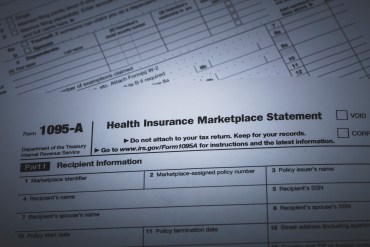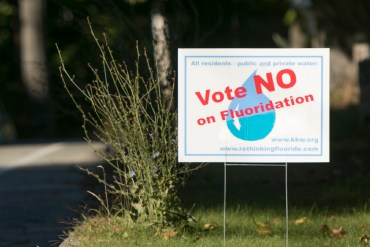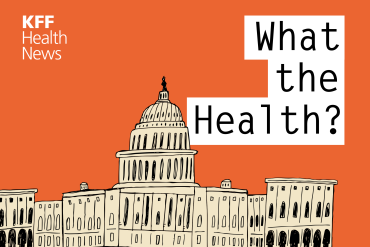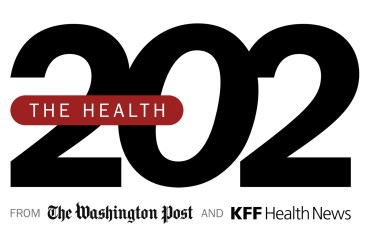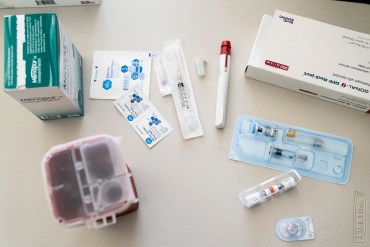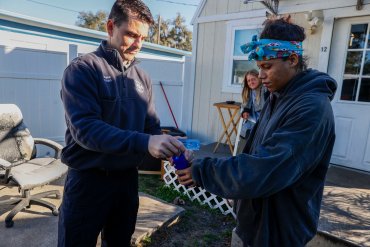When Rogue Brokers Switch People’s ACA Policies, Tax Surprises Can Follow
Some tax filers’ returns are being rejected because they failed to provide information about Affordable Care Act coverage they didn’t even know they had.
As Bans Spread, Fluoride in Drinking Water Divides Communities Across the US
The broad availability of over-the-counter dental products containing fluoride has some community leaders arguing that its addition to public drinking water is no longer necessary. But public health experts worry that, much like vaccines, fluoridation may be a victim of its own success.
What the Health? From KFF Health News: Arizona Turns Back the Clock on Abortion Access
A week after the Florida Supreme Court said the state could enforce an abortion ban passed in 2023, the Arizona Supreme Court ruled that state could enforce a near-total ban passed in 1864 — over a half-century before Arizona became a state. The move further scrambled the abortion issue for Republicans and posed an immediate quandary for former President Donald Trump, who has been seeking an elusive middle ground in the polarized debate. Alice Miranda Ollstein of Politico, Rachel Cohrs Zhang of Stat, and Rachel Roubein of The Washington Post join KFF Health News’ Julie Rovner to discuss these stories and more. Also this week, Rovner interviews KFF Health News’ Molly Castle Work, who reported and wrote the latest KFF Health News-NPR “Bill of the Month” feature, about an air-ambulance ride for an infant with RSV that his insurer deemed not medically necessary.
Arkansas Led the Nation in Measuring Obesity in Kids. Did It Help?
For more than 20 years, children in Arkansas have been measured in school as part of a statewide effort to reduce childhood obesity. But the letters have had no impact on weight loss — and obesity rates have risen. Still, the practice of sending letters has spread to other states.
Becerra Joins the Fray Over Reproductive Rights
Health and Human Services Secretary Xavier Becerra is racking up frequent-flier miles as he hopscotches the country to highlight health issues the White House hopes will become pivotal for voters this year — none more so than reproductive rights. “No woman today should fear [not having] access to the care that she needs. President Biden […]
City-Country Mortality Gap Widens Amid Persistent Holes in Rural Health Care Access
People in their prime working years living in rural America are 43% more likely to die of natural causes, like diseases, than their urban counterparts, a disparity that grew rapidly in recent decades, according to a new federal report.
Rising Complaints of Unauthorized Obamacare Plan-Switching and Sign-Ups Trigger Concern
Federal and state regulators are mulling what they can do to thwart this growing problem.
What the Health? From KFF Health News: Florida Limits Abortion — For Now
The Florida Supreme Court handed down dual abortion rulings this week. One said voters will be allowed to decide in November whether to create a state right to abortion. The other ruling, though, allows a 15-week ban to take effect immediately — before an even more sweeping, six-week ban replaces it in May. Meanwhile, President Joe Biden is doubling down on his administration’s health care accomplishments as he kicks off his general election campaign. Lauren Weber of The Washington Post, Joanne Kenen of the Johns Hopkins University schools of nursing and public health, and Tami Luhby of CNN join KFF Health News’ Julie Rovner to discuss these stories and more. Also this week, Rovner interviews health care analyst Jeff Goldsmith about the growing size and influence of UnitedHealth Group in the wake of the Change Healthcare hack.
Feds Join Ranks of Employers with Generous Fertility Benefits
Starting this year, federal employees can choose plans that cover a broad menu of fertility services, including up to $25,000 annually for in vitro fertilization procedures. At the same time, politics around IVF and reproductive health have become a central issue in the current election-year debate.
The GOP Keeps Pushing Medicaid Work Requirements, Despite Setbacks
Work requirements in Medicaid expansion programs are back on the agenda in many statehouses — despite their lackluster track record. In Mississippi, the idea has momentum from GOP lawmakers advancing legislation to expand Medicaid. In Kansas, the Democratic governor proposed work requirements to try to soften Republican opposition to expansion. (She’s had little luck, so […]
ACA Plans Are Being Switched Without Enrollees’ OK
Insurance agents say it’s too easy to access consumer information on the Affordable Care Act federal marketplace. Policyholders can lose their doctors and access to prescriptions. Some end up owing back taxes.
Hospitals Cash In on a Private Equity-Backed Trend: Concierge Physician Care
Hospitals are increasingly stretching a velvet rope, offering “concierge service” to an affluent clientele. Critics say the practice exacerbates primary care shortages.
Journalists Dig Into Measles, Abortion Access, and Medicaid Expansion
KFF Health News and California Healthline staff made the rounds on national and local media in recent weeks to discuss their stories. Here’s a collection of their appearances.
What the Health? From KFF Health News: The Supreme Court and the Abortion Pill
The Supreme Court this week heard its first abortion case since overturning Roe v. Wade in 2022, about an appeals court ruling that would dramatically restrict the availability of the abortion pill mifepristone. But while it seems likely that this case could be dismissed on a technicality, abortion opponents have more challenges in the pipeline. Meanwhile, health issues are heating up on the campaign trail, as Republicans continue to take aim at Medicare, Medicaid, and the Affordable Care Act — all things Democrats are delighted to defend. Alice Miranda Ollstein of Politico, Sarah Karlin-Smith of the Pink Sheet, and Lauren Weber of The Washington Post join KFF Health News chief Washington correspondent Julie Rovner to discuss these issues and more. Also this week, Rovner interviews KFF Health News’ Tony Leys, who wrote a KFF Health News-NPR “Bill of the Month” feature about Medicare and a very expensive air-ambulance ride. Plus, for “extra credit,” the panelists suggest health policy stories they read this week they think you should read, too.
A State-Sanctioned Hospital Monopoly Raises Concerns
The Federal Trade Commission has long argued that competition makes the economy better. But some states have stopped the agency from blocking hospital mergers that create local or regional monopolies, and the results have been messy. Two dozen states have at some point passed controversial legislation waiving anti-monopoly laws, allowing rival hospitals to merge and replacing competition […]
Históricamente, las enfermedades vinculadas al abuso del alcohol han afectado más a los hombres. Pero datos actuales de los Centros para el Control y Prevención de Enfermedades (CDC) muestran que las tasas de muerte por esta causa están aumentando más rápido entre las mujeres que entre los hombres.
More Women Are Drinking Themselves Sick. The Biden Administration Is Concerned.
Historically, alcohol use disorder has disproportionately affected men. But targeted advertising and changes in societal norms over the past 50 years have led to an upsurge in alcohol-related diseases and deaths among women. “It’s a very taboo topic,” one expert said.
A Paramedic Was Skeptical About This Rx for Stopping Repeat Opioid Overdoses. Then He Saw It Help.
For years, addiction response teams have traveled around Florida to connect people who have overdosed with resources and recovery centers. Now, a handful have a new tool in their kit: buprenorphine, which can help prevent the cravings and withdrawal symptoms that lead to more drug use.
After Appalachian Hospitals Merged Into a Monopoly, Their ERs Slowed to a Crawl
Ballad Health was granted the nation’s largest state-sanctioned hospital monopoly in 2018. Since then, its emergency rooms have become more than three times as slow.
Telehealth Sites Promise Cure for ‘Male Menopause’ Despite FDA Ban on Off-Label Ads
Most healthy men produce sufficient testosterone as they age. Yet online ads and telehealth sites are promoting testosterone drugs with flawed promises of boosting libido and busting stomach fat.




